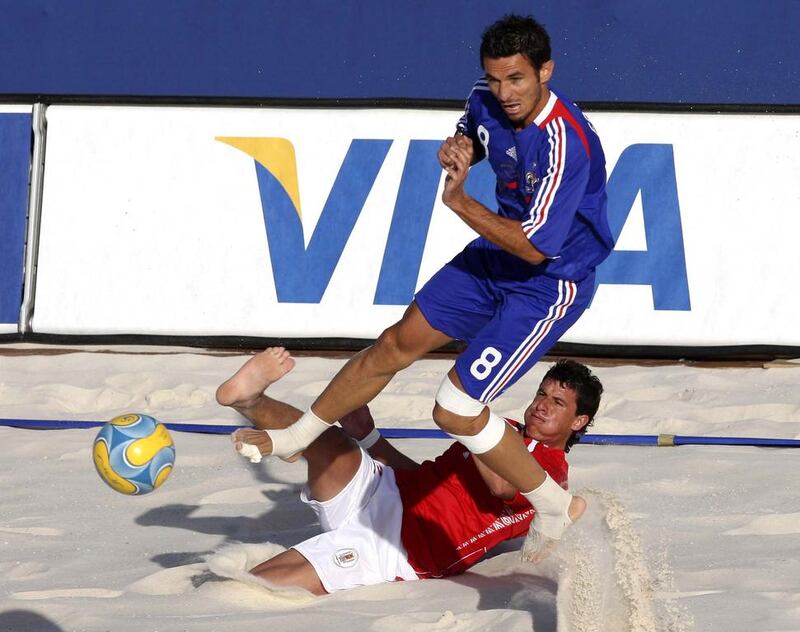Beach football might lack a superstar of the calibre of Cristiano Ronaldo or Lionel Messi at Real Madrid and Barcelona, respectively, in the traditional game but the sport is fast, frenetic and guarantees frequent goals.
It is a formula that has helped the upcoming 2013 Fifa beach Soccer World Cup attract lucrative corporate sponsorship as well as a worldwide television audience expected to measure in the millions.
The 10-day tournament features 16 national teams and gets underway on Wednesday in Papeete, the capital of Tahiti. Media rights have been secured by major television networks including Eurosport, Supersport, Canal France, ESPN and Al Jazeera which, according to Fifa, gives the tournament a broadcast footprint spanning 191 global territories.
The inaugural Beach Soccer World Cup took place in 1995 but the competition did not come under the jurisdiction of Fifa, the overall governing body for the game of football, until 2005.
Since then commercialisation has made the bidding process for the competition increasingly intense and one inevitable winner this year will be the tourism industry of the host nation Tahiti.
The defending champions are Russia, who beat Brazil 12-8 in the 2011 final, breaking the South American side’s run of four successive Beach Soccer World Cup wins. That sort of scoreline is not unusual in a game where the ball hits the back of the net every three to four minutes on average.
Matches take place over the course of three 12-minute periods, which will appeal to fans more accustomed to seeing American-style sports which tend to be high scoring and have regular intervals. This format also offers more potential for commercial advertising than a normal 90-minute football game with only has a single break.
Perhaps this is one of the reasons that blue-chip brands are attracted, meaning there is the potential for huge amounts of cash to enter the sport.
Companies sponsoring this year’s finals include including Coca Cola, with a market value of US$173.0 billion, according to Forbes, and Visa ($104.8bn).
The impressive display continues with Emirates Airline, posting profit for last year of $845 million and whose logo adorns the shirts of both Arsenal and Real Madrid, which is among the official partners as are the South Korean car manufacturer Kia, with a market capitalisation of $25.6bn, and the Japanese electronics conglomerate Sony, with a $21.6bn market cap as of June 30.
Asian sponsors will feature prominently throughout the competition but the three countries representing the region face an uphill struggle to stay involved until the latter stages because podium places at the Beach Soccer World Cup are traditionally the preserve of teams from either Europe or the Americas.
The UAE booked the third and final qualifying spot allocated to teams competing in the Asian region after beating Australia in a playoff in Doha and the country’s beach soccer scene has been burgeoning since it hosted the World Cup in 2009.
The Brazil-born UAE national team coach, Marcelo Mendes, knows his squad will have their work cut out progressing but believes the country has the infrastructure in place to become a beach soccer force in the future,
“It was important for beach soccer here for us to host the World Cup. Since 2012 we’ve had a national championship and more and more clubs are taking part in it. In addition, we now have a youth team at international level as well as a senior one. We’re aiming for the quarter-finals,” he says.
The concept of transplanting the world’s most popular sport on to the sand has been so successful that, according to official Fifa figures, the 2011 Beach Soccer World Cup was broadcast to almost 80 million homes with 7.1 million people tuning in to the final.
Virtually all tickets for the 2013 Beach Soccer World Cup have already sold out and a campaign is rapidly gaining momentum to have the sport introduced into the Olympics in time for the next summer’s games, which are set for Rio de Janeiro in 2016.
Beach Soccer World Wide (BSWW) is the organisation that has been regulating the sport since the early days and the BSWW executive vice president Joan Cusco says he hopes a successful World Cup in Tahiti will help pave the way towards Olympic recognition.
“You see the tickets close to selling out in just a couple of weeks and you witness the stunning stadium looking brighter day by day,” he says.
“Every signal confirms that we are indeed in the doorstep of a new era in beach soccer with the sport firmly knocking the doors of the Olympic Committee.”
If that happens, beach soccer in the Arabian Gulf may well be on track to follow its traditional grass-bound forerunner, the European version of which, according to Brand Finance, had a brand value last year of $17bn.
business@thenational.ae





